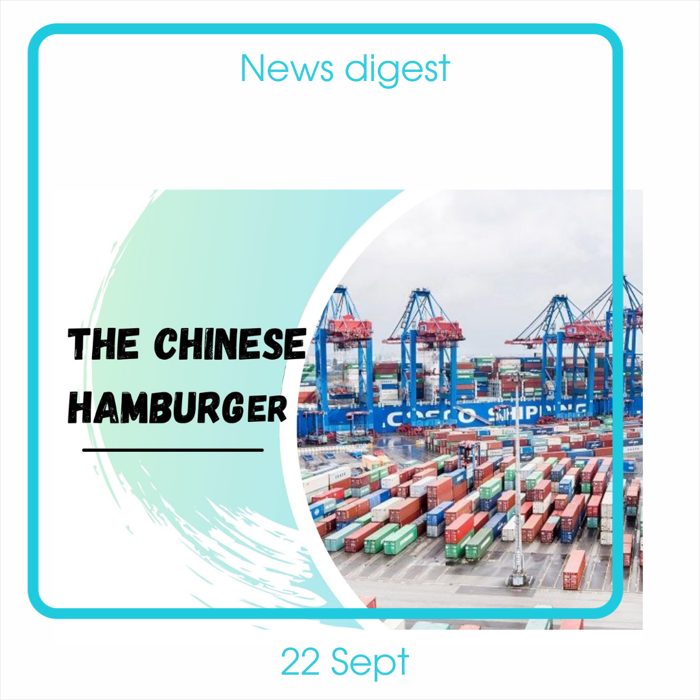News digest. 22 Sept
Perhaps the golden years of China have only just started. From the serpentine of the New Silk Road to the marine influence all the way to Hamburg.
Chinese influence on the shipping sector is so enormous that any change leads to a global consequence, so there is no wonder that stocks practically hammered in the wake of the recent events. The sudden default of Chinese property developer has evoked a wave of fear of the possible financial contagion, which, in turn, has resulted in container shipping stocks decreasing. After hitting the new “highs”, the shares of the leading lines fell in the range of 4% to 9%.
Indeed, China leads the ball not only on the Asian stage but also spreads its roots in Europe thanks to a deal that will see COSCO acquire a 35% stake in HHLA Container Terminal Tollerort in Hamburg. It is a win-win move for both sides as China gets more exposure to the European market and Hamburg strengthens its positions as a logistical hub in the European North Range and for the Baltic region. As for COSCO, the company has started the week on a controversial note because apart from a successful acquisition, the settlement of the dispute with MCS is not that much of a win. Although the parties have agreed to reinforce the business relationship, there has not been any resolution regarding MCS’s complaint seeking $600,000 in damages. Overall, the growing shipping rates driven by the congested ports continue to be the hottest topic to follow. Speaking of the latter, in California all those stuck vessels have been forced to drift off. The recent data indicates that the average time it takes for ocean freight to go door-to-door has increased to 43%. This leads to not-so-surprising consequences of the record demand in real estate near ports. The updates indicate more than 11% rent increases year-over-year. To defeat high rental rates, retailers have turned to on-demand warehousing and other short-term contracts, which is definitely not a long-run solution.
With skyrocketing demand that is impossible to keep up with, the recent initiative to cap carrier rates seems to be a joke.All the major lines have again raised rates in the last 10 days. The situation is alarming especially for the exporters using the spot markets’ guidance because for instance, it is reported that there are currently hardly any bookings ex-India to Africa, Oceania and North and South America. Even bookings on premium rates are getting rejected. With vessels running late on all major trade lanes, the situation will barely be able to resolve before the beginning of the holiday season. In addition, CMA CGM, the leader of the carrier rates’ cap failure has faced another misfortune its second cyber-attack in less than a year. The company has confirmed that there is a data leakage of limited customer information.
Since charter rates will not go down any time soon, some players decide to use the moment to their advantage despite the crumbling competitors. Apparently, British NVOCC with its unit based in Hong Kong has been successfully chartering multi-purpose ships to carry containers from China to the UK. Moreover, it has been securing space by chartering entire vessels.
Meanwhile, not everything is in the bright colors for the UK as its government is beating around the bush of implementation of the Brexit customs procedures by further postponing the deadlines, although forwarders, shippers, and other players claim to be ready for the new rules. The more they get postponed, the more frustration and annoyance grow because the implementation of export health certificates, safety and security declarations for goods imported from the EU, etc. have been “cooking” for ages. The biggest concern is that companies spend significant resources on adjusting their systems and training their employees to do the work in accordance with the new regulations and nobody wants things to be left in vain. Perhaps, the best way to divert the public’s attention from the “slow” policies is to focus on what has already been achieved and this is where rail comes in handy. Once again, it has proven to be a major force behind growth according to the new studies. This is right on time with the CEF for Transport program that makes available 7 billion euros for projects targeting new, upgraded and improved European transport infrastructure. The main purpose of it is to increase the sustainability of the overall transport network of the EU. With the new “green” technologies on the way, the transportation sector gets all the trump cards for vigorous development.
It is not a secret that the crisis massively boosted e-commerce, and although at some point it may have seemed that the trend has slowed down, it is not necessarily true. It is still booming and more and more companies believe that digital will not go back but on the contrary, it will continue evolving. DHL already plans to invest $300 mil in e-commerce over the next five years. In turn, Wincanton has strengthened its e-commerce offer with the acquisition of Cygnia Logistics, a leading specialist e-fullfilment business. The chosen approach aims to give room for agility and more advanced practices.

